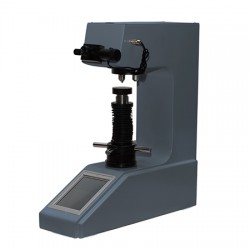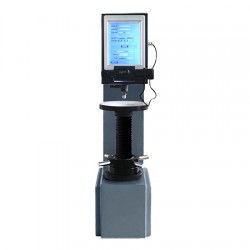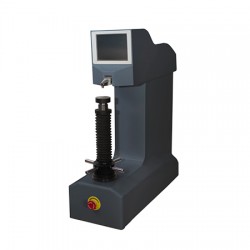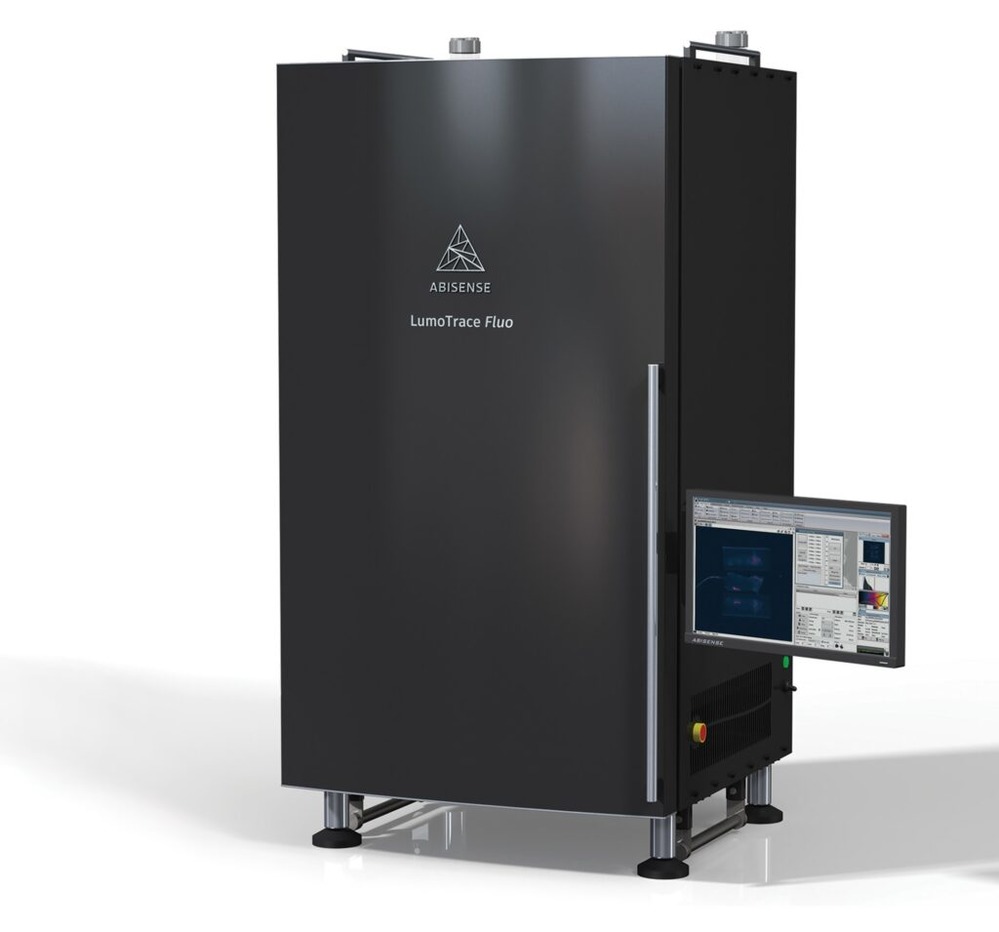Catalog
Search
211 products
View:
- Selected: 1Areas of use
- Selected: 0Item names
- Selected: 0Manufacturer
- Selected: 0Made in
- Selected: 0Additional
View:
211 products

SNVS Vacuum Furnace-3.3/17- I2-2VO
High-temperature furnaces are capable of heating materials up to 1700 degrees. The scope of their application covers the heat treatment of various materials in an inert medium or vacuum. TULA-TERM furnaces are used for heat treatment of plastics, ceramics, metals, alloys, lacquers and other materials. The equipment allows sintering, annealing, soldering, quenching, drying, burning and molding. In industry, our installations are most often used for quenching parts and sintering hard alloys.
Tula-Term
Tula
Produced in: Tula

Metolab 452 Vickers Hardness Tester
METOLAB 452 is a stationary Vickers hardness tester – a modification of the METOLAB 451 device with a large color display and improved characteristics. The METOLAB 452 hardness tester is designed to measure the hardness parameters of steels, cast iron, non-ferrous metals, soft alloys and other similar materials on the HV scale in full compliance with GOST R ISO 6507-1-2007. The device has excellent accuracy and provides high repeatability of measurements.
METOLAB 452 is a stationary hardness tester equipped with an automatic loading system, as well as a digital display. Thanks to the software of the device, switching from the indenter to the lens also occurs in automatic mode. Other features of the hardness tester include software calculation of hardness values, statistical processing of results (calculation of average/maximum/minimum values), conversion of results into Vickers, Brinell, super-Rockwell scales.
The automatic METOLAB 452 Vickers hardness tester is included in the State Register of Measuring Instruments of the Russian Federation (GRSI) and comes with a certificate of primary verification (on request). The entry number in the GRSI is 67656-17.
Distinctive features of the automatic stationary METOLAB 452 Vickers hardness tester:
Simple and intuitive interface, full Russification of the device;
Wide range of measured values – from 5 to 2500 HV;
Wide range of applied test load: 1 kg (9.8 N); 2 kg (19.61 N); 3 kg (29.4 N); 5 kg (49 N); 10 kg (98 N); 20 kg (196.1 N); 30 kg (294 N); 50 kg (490 N);
The functionality of converting the obtained values into a number of scales: HRA, HRB, HRC, HRD, HRF, HV, HK, HBW, HR15N, HR30N, HR45N, HR15T, HR30T, HR45T;
Automatic switch of the applied load;
Large and bright LCD display;
Automatic switching from the indenter to the lens;
U disk for saving data in Excel format for easy editing and processing;
Digital calibration.
Basic delivery package:
Stationary METOLAB 452 hardness tester;
Standard Vickers hardness test - 2 pcs.;
Flat desktop;
Large flat desktop;
V-shaped desktop;
Micrometer;
Diamond indenter with an angle at the top of 136°;
User Manual.
Metolab
Moscow
Produced in: Moscow

Shaft furnace industrial SSHO-6.18/11
Designation
SSO-6.18/11
Power, kW
40
Diameter, mm
600
Height, mm
1800
Tula-Term
Tula
Produced in: Tula

Furnace for heating in a protective environment SNO 5/17
Designation
SNO 5/17
Power, kW, no more
8
Volume, l
5,8
Supply network voltage, V
380
Frequency, Hz
50
Temperature
1700
Vacuum
10 mm
Protective/oxidizing environment
Management
Thermodat + PLC
Tula-Term
Tula
Produced in: Tula

Electric furnace tubular laboratory SUOL 0,4.4/11
from
169 773 ₽
Electric tubular laboratory furnaces are designed for calibration of thermocouples and dilatometers, heat treatment and determination of the melting point of metals, alloys and other work at temperatures up to 1100 ° C in stationary laboratories. SUOL tubular furnaces are used in many industries and agriculture, are indispensable in factory and research laboratories.
Tula-Term
Tula
Produced in: Tula

Metolab 602 Brinell Hardness Tester
The METOLAB 602 device is a stationary hardness tester according to the Brinell method (HBW scale) with automatic loading system and digital display. Among the features of the METOLAB 602 hardness tester are an electronic load value switch, an automatic turret, a large and bright LCD display with the ability to display the values obtained, as well as automatic translation of the results obtained into the Rockwell and Vickers scales. Additionally, it is worth noting the possibility of prompt printing of measurement results using a built-in printer.
The stationary METOLAB 602 Brinell hardness tester allows measurements of various materials, including steels, cast iron, non-ferrous metals, soft alloys, etc.
Due to its characteristics, the stationary METOLAB 602 Brinell hardness tester can be used in a wide variety of industries and production, as well as in educational institutions of various levels in the training of specialists.
The stationary METOLAB 602 Brinell hardness tester is included in the State Register of Measuring Instruments of Russia (GRSI) and comes with a certificate of primary verification (on request). The number in the GRSI is 65684-16.
Distinctive features of the stationary METOLAB 602 Brinell hardness tester:
Easy to operate and maintain the hardness tester;
Fully Russified menu;
A wide range of measured values – from 8 to 650 on the HBW scale;
The METOLAB 602 hardness tester has a built-in automatic switch of the applied load;
Large and bright LCD display, protected membrane keyboard;
Display of all necessary service information on the display;
Measuring the diameters of prints using the built-in digital microscope 20x;
The ability to quickly print out the measurement results on the built-in printer;
High accuracy and repeatability of measurements;
Automatic loading system.
Basic package of delivery:
Stationary METOLAB 602 Brinell hardness tester;
Microscope, 20x;
Indenter with carbide ball (10.0 mm; 5.0; 2.5) - 1 pc.;
Large flat table;
Small flat table;
V-shaped table;
Brinell hardness measures - 1 set;
User Manual.
Metolab
Moscow
Produced in: Moscow

Metolab 103 Rockwell Hardness Tester
METOLAB 103 is an automatic electromechanical stationary device designed to measure the hardness parameters of various materials and products (steel, cast steel, alloy steel, non–magnetic metals, plastics and other materials) according to the Rockwell method, scales A, B, C, and also allows converting the results into Vickers, Brinell and Super-Rockwell scales. It is important to note that the stationary METOLAB 103 hardness tester has the ability to produce results on a PC in the form of Excel spreadsheets.
All measurements carried out by the METOLAB 103 hardness tester fully comply with current standards, including BS.EN 10109 and ISO716. The stationary METOLAB 103 hardness tester is listed in the State Register of Measuring Instruments of the Russian Federation under number 65128-16 and comes with a certificate of primary verification (on request).
Regulatory and technical documents establishing requirements for the METOLAB 103 hardness tester:
GOST 8.064-94 GSI. State verification scheme for hardness measuring instruments on the Rockwell and Super-Rockwell scales;
GOST 9013-59 Metals and alloys. Rockwell hardness measurement method. Scales A, B, C;
GOST 22975-78 Metals and alloys. Rockwell hardness measurement method at low loads (Super-Rockwell);
GOST 23677-79 Hardness testers for metals. General technical requirements.
Distinctive features of the stationary Metolab 103 Rockwell hardness tester:
Thanks to the special design of the measuring platform, it is possible to measure hardness in hard-to-reach places (grooves, holes, etc.);
Measurements are fully automated;
The ability to set the lower / upper limits of measurements, audible alarm when values exceed the set limits;
Statistical processing of results – output of minimum/average/maximum values, conversion of results into Brinell, Vickers, Super-Rockwell scales;
Correction for curvature when measuring a convex or cylindrical part;
Simple and intuitive control of the devices, the menu in Russian.
Basic delivery package:
Stationary Metolab 103 Rockwell hardness tester;
Indenter with a ball (1.5875 mm) - 1 pc.;
Spare ball (1.5875 mm) – 3 pcs.;
Conical diamond indenter (120°) - 1 pc.;
Flat table SP1 (60 mm);
V-shaped prismatic table SRP1 (40 mm);
Rockwell Hardness measures;
User Manual.
Metolab
Moscow

A walk-through oven with a hearth roller
The rolling (roller) continuous flow furnace SRO 11.60.3/9 with adjustable heating temperature is designed for heat treatment (heating, holding) of parts at temperatures up to 900 ° C in an oxidizing environment. The furnace can be used in various industries related to the heat treatment of metal.
Furnaces of this type have a number of advantages:
an almost unlimited length of the furnace, which allows to increase productivity;
high performance due to heating of each part from all sides (without shielding by adjacent parts and accessories);
minimal metal burn;
full automation of the process;
round-the-clock operation;
mechanization of transportation of processed metal
Tula-Term
Tula
Produced in: Tula

Device for preparation of metal samples
A device for preparing metal samples for spectral analysis.
For the preparation of metal samples, an emery cloth or paper with a given size and abrasive material is used.
The rotation speed is 1500 revolutions per minute.
A quick stop of the motor is provided by an automatic control unit.
There is a version in a housing made of composite materials with two discs, each can have its own type of abrasive.
VMK OPTOELEKTRONIKA
Novosibirsk
Produced in: Novosibirsk

Metolab 100 Rockwell Hardness Tester
METOLAB 100 is an analog stationary hardness tester with manual loading, designed to measure the hardness of various materials according to the Rockwell method, HRA, HRB and HRC scales, in accordance with current standards, equipped with an analog clock–type indicator.
Structurally, the METOLAB 100 hardness tester is a stationary device consisting of a load application mechanism and the measuring unit itself. The principle of operation of the device is based on the indentation of a diamond cone or steel ball tip into the material under study, followed by measurement of the resulting print.
Due to its ease of operation, the stationary METOLAB 100 hardness tester can find its application in a wide variety of industries and production, as well as in educational institutions of various levels in the training of specialists.
The stationary METOLAB 100 Rockwell hardness tester is included in the State Register of Measuring Instruments of Russia (GRSI) and comes with a certificate of primary verification (on request). The number in the GRSI is 65128-16.
Distinctive features of the stationary METOLAB 100 Rockwell hardness tester:
Simple and convenient both in operation and maintenance;
Wide range of measured values;
High degree of reliability due to the absence of electronic components in the design of the hardness tester;
The device operates without power.
Basic delivery package:
Stationary METOLAB 100 hardness tester;
Indenter with a ball (1.5875 mm) - 1 pc.;
Conical diamond indenter (120°) - 1 pc.;
Flat table SP1 (60 mm);
V-shaped prismatic table SRP1 (40 mm);
Rockwell hardness measures - 1 set;
User Manual.
Additional information: GOST standards and regulatory documents establishing requirements for the METOLAB 100 Rockwell hardness tester:
GOST 8.064-94 GSI. State verification scheme for hardness measuring instruments on the Rockwell and Super-Rockwell scales;
GOST 9013-59 Metals and alloys. Rockwell hardness measurement method. Scales A, B, C;
GOST 22975-78 Metals and alloys. Rockwell hardness measurement method at low loads (Super-Rockwell);
GOST 23677-79 Hardness testers for metals. General technical requirements.
Metolab
Moscow
Produced in: Moscow

Radiation Monitoring Station Zastava-1
Devices of a new generation, automated stations of continuous radiation monitoring Zastava-1 are designed to organize continuous effective monitoring of the radiation situation and notification of radiation hazards. The stations have up to three independent measurement channels, which allows monitoring simultaneously in several zones. The stations support remote monitoring - they have a connection to a local computer network, Internet access.
NPP "ELEKTRONNYE PRIBORY"
Naberezhnye Chelny
Produced in: Tatarstan, Naberezhnye Chelny

Express Mössbauer spectrometer MS1104Em
The MS-1104E spectrometer is characterized by high performance and accuracy of Mössbauer measurements achieved through the use of “compressed” geometry, as well as the use of highly efficient and selective resonant scintillation detection units that improve the energy resolution of resonance absorption lines by up to 30%. The technique of software and hardware stabilization of the spectrometric path developed and used in the spectrometer allows for long-term Mossbauer measurements without manual adjustment. The method of modulation in the specified speed intervals can significantly increase the sensitivity and expressiveness of measurements and reduce the time to determine the magnitude of the effects of resonant absorption by tens of times in the study of temperature phase transitions with a low concentration of resonant elements.
The electronic components of the spectrometer are developed on the basis of a modern element base using programmable logic matrices and microprocessors. Adjustable spectrometric paths and high-voltage power supplies of the PMU are integrated into detection units, modulator driver modules and multi-channel storage are made in the ISA standard and are located in the processor unit of the computer. Setting and monitoring of all parameters of the spectrometer and processing of the measured spectra is carried out from the operating windows of the control and processing programs.
Since 2000, more than ten spectrometers of this type have been supplied to leading scientific organizations in Russia and neighboring countries. One of the few industrial applications of Mössbauer spectroscopy should be noted - the development and supply to the Volgodonsk NPP of certified MS-1104Em methods and spectrometer for monitoring corrosion processes in the heat exchange circuits of the VVER-1000 reactor.
Department of Analytical Instrumentation SFU
Ростов-на-Дону
Produced in: Rostov-on-Don
